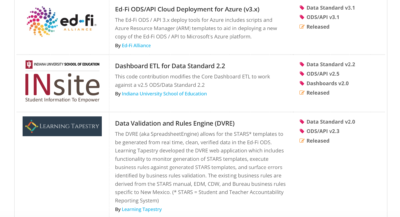Beyond helping school districts through the technical journey of implementing the Ed-Fi Data Standard and APIs, we often advise on how to make the most of their data teams and resources. Data governance isn’t something that just falls into place, and there’s no one-size-fits-all approach. Your school district’s data governance structure should be built democratically to reflect your district’s culture, available talent, and resources.
The term “data governance” is a bit daunting, so let’s break it down.
Every school district should be able to answer these questions:
- Who are our data leaders?
- What is our data decision-making process?
- Who do we partner with to strengthen our data practices?
As you work to reach consensus on the answers to these questions, you may uncover staff and resourcing needs and potential solutions—such as rearranging teams or responsibilities, receiving training to fill skill gaps, or hiring a data scientist.
Of course, not every district is resourced to make these investments. We’re here to help you make the most out of what you’ve got, while also outlining a clear vision for the future. Let’s dig into each of these three questions, pointing to districts and collaboratives that are shining examples of effective data governance.
Who are Your Data Leaders?
In every school district, the superintendent and board establish policies to increase student performance. Then they call on someone or some group of people to measure and report on these changes. It could be the assistant superintendent or a director of data, research, or accountability who’s tasked with finding the data to support these initiatives.
In smaller districts, it’s likely that no one has “data” in their title and these roles are combined and shared. Regardless, the need to uncover and analyze student data is ubiquitous. And pre-interoperability, the data hides in many places—from homegrown databases and applications to hosted commercial systems, people’s brains, and spreadsheets locked up in different departments.
Ready or Not, Someone’s Governing Your Data
Every district has state accountability requirements and tasks someone with corralling the data for reporting. If that someone is you, you’re filling the role of a data leader for your organization—whether it’s reflected in your title or not! So how do you get out from behind the CSV files to guide your organization toward effective data processes and partnerships?

Firstly, do you want to be the data leader? Do you have the support and knowledge you need to be successful?
Data gurus exist in most school districts, but they often don’t have any official mandate to assist teams with strategic guidance. They tend to know quite a bit about the entire organization’s structure, systems, and processes, and this critical understanding of the big picture goes to waste. This is why—once your data leaders are identified—your district’s governance process needs to be defined.
What is Your Data Decision-Making Process?
This is where the Ed-Fi Data Standard and data interoperability start to show their value from a governance standpoint.
When we talk about interoperability, we should not be talking about systems alone. Data interoperability is just as much about insight-driven teaching and administrating as it is about data systems and management. When you think about it this way, many more players should be invited to the table.
As a data leader in your district, it’s up to you to guide every team that touches data to view the data standard as common ground. When you all agree that this is the language you’ll adhere to and each department sees the value, you’ve laid a solid foundation for your data governance structure.
Now, discuss with each team: Which stakeholders beyond your identified data leaders should be in the know and weighing in as data decisions are made?
At Metro Nashville Public Schools, their data leaders have assembled a Data Advisory Team to pull their identified stakeholders together. This advisory team keeps Nashville’s curriculum, assessment, accountability, IT, and data teams connected. They use the Ed-Fi Data Standard as their vocabulary— lending clarity and transparency not only to their data but also to their people and processes.
Ed-Fi’s own governance structure is a more complex example. Our Technical Advisory Group, Advisory Board, and Community Workgroups operate in tandem, ensuring diverse perspectives are steering the organization.
Who do you Partner With to Strengthen Your Data Practices?
If your district is going it alone, building your solutions from scratch, then no wonder you’re feeling in over your head! The ultimate goal of data governance is to get organized internally so you can reach out beyond your organization and integrate strategic partners.
With Ed-Fi as your first partner and resource, there are many more potential partners waiting for you within the Ed-Fi Community. Start by connecting with other districts and reviewing shared solutions in the Ed-Fi Exchange:
Look for data collaboratives in your region, or form your own! Large and small groups in every corner of the country, from Florida to New England to California, have joined forces to lead the interoperability and data standardization charge. Michigan DataHub, Florida CODE, California CORE, Indiana INSITE are among the most impressive.
Then, you can get creative with community partnerships to set your students up for success far beyond their time in school. We love the Dallas County Promise use case. With the Ed-Fi Data Standard at its core and surrounded by an impressive network of school and business partners, they’re taking a completely data-driven approach to career readiness. And it’s working.

“Through the Ed-Fi Alliance Community, we’ve been able to connect with districts and their vendors and implement data interoperability through the Ed-Fi Data Standard and Technology Suite. Now, we are able to drive college and career preparation opportunities for Dallas County high school students programmatically, in real-time.”
-Eric Ban, Managing Director, Dallas County Promise
You’re in the Right Place!
Look no further than the Ed-Fi Community. Our team is here to help you and connect you with other committed districts, vendors, and organizations. These connections can share their data governance tips and help your district find what works for you.
Start by attending the 2019 Ed-Fi Summit! It’s impossible to leave this event without new partners, and governance will be a major theme at this year’s event.


